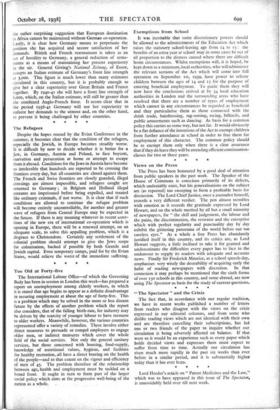Exemptions from School It was inevitable that some discretionary powers
should be allowed to the administrators of the Education Act which raises the statutory school-leaving age from 14 to 15 : the benefits of an extra year at school may in some cases be out of all proportion to the distress caused where there are difficult home circumstances. Whilst exemptions will, it is hoped, be kept down to a minimum, local authorities, who will administer the relevant sections of the Act which will come into full operation on September 1st, 1939, have power to release children between the ages of 14 and i5 for the purpose of entering beneficial employment. To guide them they will now have the conclusions arrived at by 34 local education authorities in London and the surrounding areas who have resolved that there are a number of types of employment which cannot in any circumstances be regarded as beneficial and they particularise them as those connected with the drink trade, hairdressing, rag-sorting, racing, billiards, and public amusements such as dancing. As basis for a common policy this carries us some way, but not far. It would obviously be a flat defiance of the intentions of the Act to exempt children from further attendance at school in order to free them for employment of this character. The common policy should be to exempt them only when there is a clear assurance that if they do leave they will be attending efficient continuation:. classes for two or three years.
* * * *
























































 Previous page
Previous page